Bills on pandemic power, virus lawsuit protection advance

An Alabama Senate committee on Wednesday advanced bills related to the COVID-19 pandemic, including a proposal to limit the power of the state health officer and another to extend liability in virus-related lawsuits. The Senate Judiciary Committee voted 7-4 to approve a bill by Republican Sen. Tom Whatley of Auburn that would give elected politicians oversight of emergency decisions currently made by the state health officer. The proposal would require the state governor to approve the state health officer’s emergency health orders during a pandemic. It also would require legislative approval to extend an emergency declaration beyond 14 days. “It still maintains emergency powers in emergency situations for the governor. It just transfers the authority for making those decisions from an unelected person to a person elected by the people of Alabama,” Whatley said. Whatley said he did not bring the bill in response to any particular actions by State Health Officer Scott Harris, but said there should be a “check and balance.” Democratic Sen. Vivian Davis Figures of Mobile said lawmakers should not interject themselves when “dealing with life and death situations.” Alabama Gov. Kay Ivey expressed skepticism about the bill on Wednesday. “I don’t know that we need to limit the hands of decision-makers, especially when they’re guided by health people trying to give us good advice too,” Ivey told reporters. “We’ll just have to see where that goes.” Committee members voted 9-2 to advance a bill to shield companies and others from lawsuits during the pandemic. The bill by Republican Sen. Arthur Orr could provide immunity for businesses, health care providers, and others from certain damages claimed by individuals who allege that they contracted or were exposed to the virus. Orr said the bill would give protection to companies, churches, and other entities from virus-related claims only if they were following appropriate precautions. “A business that chose to ignore that guidance and did not require, say like masks in their workplace or took no steps to try to limit the interaction of their workers being very close together then they would not have protection in that safe harbor,” Orr said. The governor and GOP leadership have said the bill is a priority and it could receive a floor vote as soon as Thursday. Opponents said they were concerned the bill would give companies too much protection for risky practices. Robin Hyden of Alabama Arise, an advocacy group for low-income people, urged lawmakers to take more steps to protect workers. “Front-line workers deserve access to health care, hazard pay, and social support programs if they are unable to work in a high-risk field. Too many workers are being driven into risky working conditions with no alternatives,” Hyden said. The Senate committee also advanced medical marijuana legislation by an 8-3 vote. The bill by Republican Sen. Tim Melson would allow people with a qualifying medical condition to purchase marijuana, in forms such as gels or tablets, for medical use from licensed dispensaries. The bill cleared the Senate last year with a 22-10 vote but did not get debated in the House of Representatives. Republished with the permission of the Associated Press.
Thousands flocking to virus vaccination sites across Alabama

Thousands of people showed up at sites from the coast to the Tennessee Valley as Alabama began vaccinating senior citizens for the coronavirus that causes COVID-19. People spent the night in cars waiting for shots in Baldwin County, where health workers began immunizing people early Tuesday. County health workers in Huntsville vaccinated 500 people on Monday although only 300 people had appointments. Other sites opened in cities ranging in size from Birmingham to Rainsville. The state is offering vaccines to people 75 and older after limiting the initial doses to health workers. Alabama is among the Southern states trailing the nation in the rate of vaccinations. In Limestone County, Pat White showed up to get her first of two doses of the Moderna vaccine Monday. She said she misses going to church and has done little other than buy groceries to protect against catching the virus. “We’ve lost many friends to COVID, and we’re older, so that made me think it was probably the right thing to do,” White told WAAY-TV. Alabama Department of Public Health statistics show about 150,000 have received shots statewide, but the number does not include those who were immunized most recently. More than 600,000 people are currently eligible for vaccinations in Alabama, including 325,000 health care workers and 350,000 people who are 75 or older. The state has so far received 446,000 doses, according to state numbers. The University of Alabama at Birmingham Hospital has been notifying patients, who are 75 and older, to have them come to get vaccinated. “At the vaccine site, it’s not uncommon for people just to break down in tears when they receive their vaccine. People are just so tremendously relieved to finally have received the vaccine and have some hope,” Dr. Sarah Nafziger, vice president of Clinical Support Services at UAB Medicine, said. More than 6,100 people have died of COVID-19 in Alabama, and more than 424,000 people have tested positive for the new coronavirus. Over the past two weeks, the rolling average number of daily new cases has decreased by 881, a decline of almost 24%, according to researchers at Johns Hopkins University. The virus causes only mild or moderate symptoms in most people, but it is particularly dangerous for the elderly and people with other, serious health problems. Nafziger said the delivery of the vaccinations is also providing a boost to health care workers who spent much of 2020 battling the pandemic. “We’ve been in a really rough place, especially in health care. For the last year, it’s been a tremendous burden. We’re exhausted. But just finally having hope has been a tremendous boost for all of us and I hope it is for the community as well,” Nafziger said. The Alabama Department of Public Health last week disputed rankings that put Alabama last in vaccination delivery and said that was because some entities had not reported given vaccinations. Four state senators wrote a letter Tuesday raising concern about the process and asking for updated numbers on vaccinations given. They expressed concern that incomplete reporting could threaten the flow of vaccine to the state if federal officials see the state has unused vaccine on the shelf. “While the supply pipeline is definitely an issue, our pipeline in Alabama has a kink,” Sens. Jim McClendon, Greg Albritton, Tom Whatley, and Randy Price wrote. The Alabama Department of Public Health responded in a statement disputing the assertion. The department said that the number of COVID-19 vaccine doses allocated to Alabama is based on our population, and “is not determined by how much vaccine is on hand in the state.” “The biggest obstacle to vaccination in Alabama is the limited supply of vaccine. Alabama currently has approximately 676,000 people in Alabama who qualify to receive a COVID-19 vaccine, but since our state is allocated only around 50,000 – 60,000 primary doses each week, the supply is not available to reach these numbers at this time,” the department said. Republished with the permission of the Associated Press.
No votes on virus liability, health officer power bills

Lawmakers agreed to limit the abbreviated legislative session to state budgets, local bills and a school bond issue.
Senate bill seeks to remove anti-gay language from state’s sex education law

An Alabama Senate committee has approved a bill that would remove anti-gay language from the state’s sex education law. The Senate Education Policy Committee unanimously voted in support of SB269: the Alabama Youth Health Protection Act sponsored by Auburn-Republican state Sen. Tom Whatley on Wednesday. “If you’re teaching sex education, you’ll going to be medically accurate when you’re doing it,” Whatley told the committee. Specifically, it would strike language that says homosexuality is a lifestyle that’s not “acceptable to the general public.” An emphasis, in a factual manner and from a public health perspective, that homosexuality is not a lifestyle acceptable to the general public and that homosexual conduct is a criminal offense under the laws of the state. The language in the state current sex education law, above, was a reference to Alabama’s anti-sodomy law, which has been ruled unconstitutional. Whatley’s bill also maintains an emphasis on abstinence as the “only completely effective protection against unwanted unintended pregnancy, sexually transmitted diseases infections, and acquired immune deficiency syndrome (AIDS) human immunodeficiency virus (HIV) when transmitted sexually.”
Cam Ward introduces bill to increase penalties for human trafficking

An Alabama state senator introduced a bill on Tuesday to enhance the criminal penalties for obstructing the enforcement of the human trafficking laws in Alabama. Alabaster-Republican State Sen. Cam Ward introduced SB179, which was cosponsored by Tom Whatley (R-Auburn) and Gerald Dial (R-Lineville). According to the Federal Bureau of Investigation (FBI), human trafficking is believed to be the third-largest criminal activity in the world. “It is a form of human slavery which must be addressed at the interagency level. Human trafficking includes forced labor, domestic servitude, and commercial sex trafficking.” “This awful crime preys predominately on children,” Ward tweeted of the bill on Wednesday. While many Alabamians are unaware of its ongoings, sex trafficking is actively happening not only abroad, but also in Alabama. According to the National Human Trafficking Hotline at least 36 human trafficking cases were reported in the Yellowhammer State in 2017. They also report more than 111 victims of human trafficking in Alabama have called its hotline for help this year. In fact, the stretch of I-20 between Atlanta and Birmingham is known as the Sex Trafficking Superhighway. “It cuts right there through downtown Birmingham, and what we’re finding, unfortunately with the interstate system that you and I use to get from Birmingham to Montgomery — is that people are using it to bring in girls, for example, for a short period of time. Buyers are available, and then they leave,” David Pinkleton, fundraising chair for the Alabama Human Trafficking Task Force told CBS 42 last year. Under existing law, human trafficking is a crime. Additionally, obstruction of the enforcement of the laws criminalizing human trafficking is a crime. Under the proposed law, a person commits the crime of human trafficking in the first degree if: He or she knowingly subjects another person to labor servitude or sexual servitude through use of coercion or deception. He or she knowingly obtains, recruits, entices, solicits, induces, threatens, isolates, harbors, holds, restrains, transports, provides, or maintains any minor for the purpose of causing a minor to engage in sexual servitude. For purposes of this section, it is not required that the defendant have knowledge of a minor victim’s age, nor is reasonable mistake of age a defense to liability under this section. A corporation, or any other legal entity other than an individual, may be prosecuted for human trafficking in the first degree for an act or omission only if an agent of the corporation or entity performs the conduct which is an element of the crime while acting within the scope of his or her office or employment and on behalf of the corporation or entity, and the commission of the crime was either authorized, requested, commanded, performed, or within the scope of the person’s employment on behalf of the corporation or entity or constituted a pattern of conduct that an agent of the corporation or entity knew or should have known was occurring. Any person who obstructs, or attempts to obstruct, or in any way interferes with or prevents the enforcement of this section shall be guilty of a Class A felony. Human trafficking in the first degree would be a Class A felony. Under the bill if a person commits the crime of human trafficking in the second degree if: A person knowingly benefits, financially or by receiving anything of value, from participation in a venture or engagement for the purpose of sexual servitude or labor servitude. A person knowingly recruits, entices, solicits, induces, harbors, transports, holds, restrains, provides, maintains, subjects, or obtains by any means another person for the purpose of labor servitude or sexual servitude. A corporation, or any other legal entity other than an individual, may be prosecuted for human trafficking in the second degree for an act or omission only if an agent of the corporation or entity performs the conduct which is an element of the crime while acting within the scope of his or her office or employment and on behalf of the corporation or entity, and the commission of the crime was either authorized, requested, commanded, performed, or within the scope of the person’s employment on behalf of the corporation or entity or constituted a pattern of conduct that an agent of the corporation or entity knew or should have known was occurring. Any person who obstructs, or attempts to obstruct, or in any way interferes with or prevents the enforcement of this section shall be guilty of a Class B felony. Rainbow City-Republican State Representative Mack Butler is expected to sponsor a similar bill in the House.
Bill to mandate insurance coverage for autism therapy heads to Kay Ivey’s desk
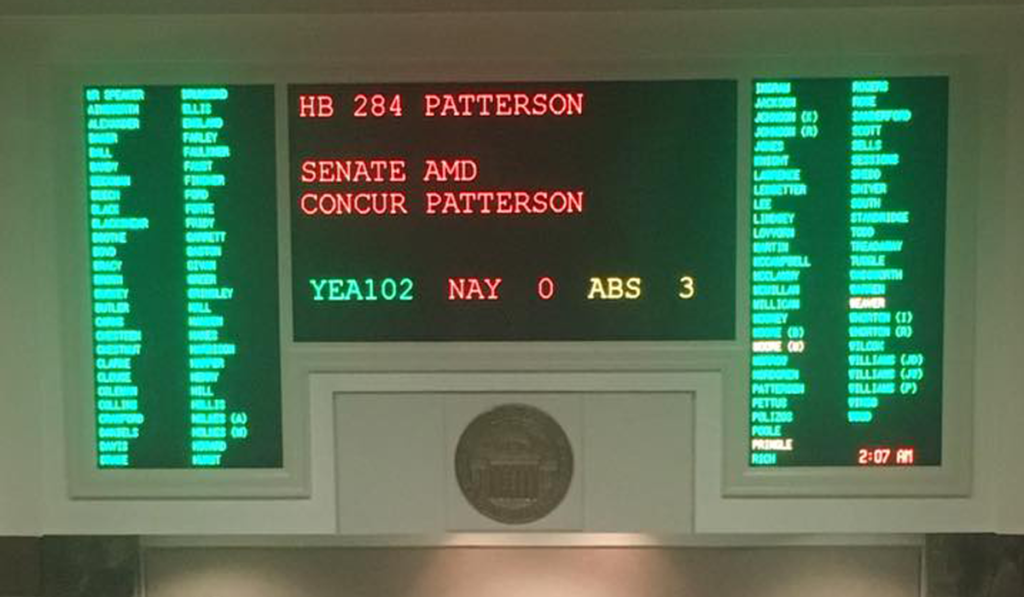
While most Alabamians were sound asleep, state lawmakers were hard at work trying to get legislation across the finish line early Thursday morning. Making it past its final hurdle, HB284, a bill mandating insurance coverage for autism therapy, was approved by Alabama House of Representatives at 2:07 a.m. when members concurred 102-0 with an amended Senate version. The final version of the bill includes amendments from its original version such as making the mandate only apply to patients up to 18 years of age, applying only to companies with at least 51 employees, and delaying the mandate altogether on public plans until Dec. 31, 2018. “I am so proud that our State has done the right thing!” the bill’s sponsor Meridianville-Republican Rep. Jim Patterson said in an early Thursday morning Facebook post. Patterson is referring to his colleagues decision to support the bill, which faced a tenuous road to final passage. Last month the House unanimously passed the bill, 100-0, but the legislation found itself in jeopardy when it reached the Senate due to concerns over costs, as it requires providers to cover an intensive therapy called Applied Behavioral Analysis (ABA) therapy. However, following an outpouring of public support, the Senate ultimately approved the measure, 33 to 1, Tuesday with a few amendments to the House bill, which is what triggered the late-night House concurrence vote. “I voted yes on behalf of my district. I hear you loud and clear,” Huntsville-Republican Paul Sanford posted on Facebook after the vote. The bill now moves to the desk of Gov. Kay Ivey. According Patterson, Ivey will sign the bill during a 10 a.m. Friday ceremony.
Autism insurance bill stalls in Alabama Senate
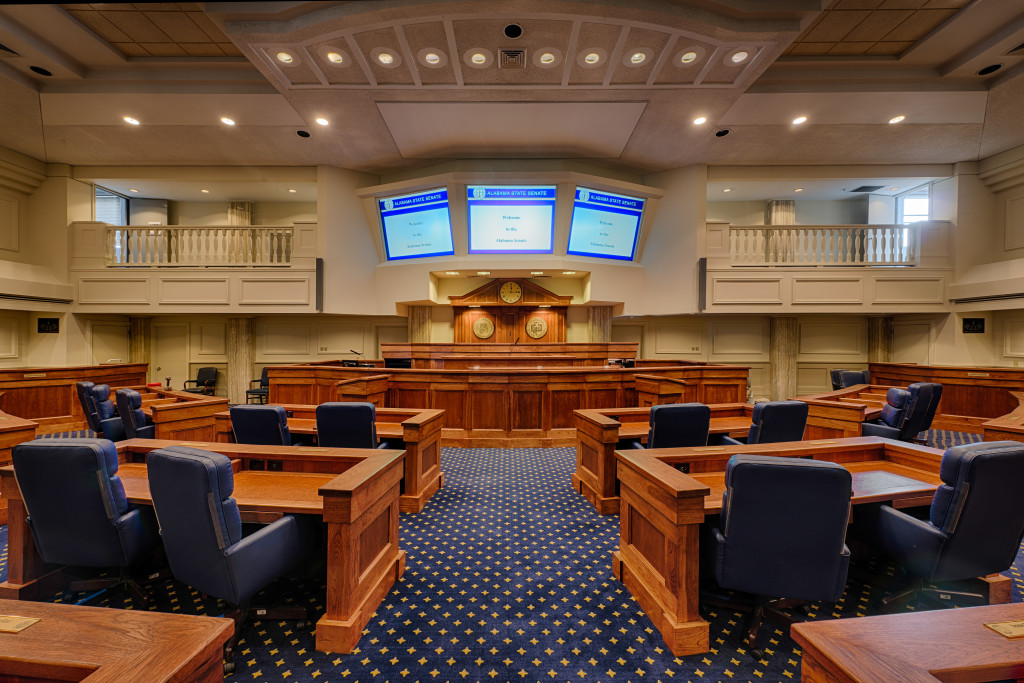
Families of autistic children faced a set-back Monday when a bill that would require health insurance providers cover an expensive autism therapy stalled in the Alabama Senate. The bill, which passed the state House unanimously two weeks ago, is held up in the Senate Budget Committee where Chairman, Daphne-Republican Sen. Trip Pittman says there are concerns over the costs to the state. Alabama is one of only five states with no requirement that insurance companies cover the costly therapy, called Applied Behavior Analysis (ABA). According to the bill’s language, children with autism who are 9 years old and younger would be insured for up to $40,000 in treatment per year. That coverage would decrease to $10,000 per year by age 19. The bill faces heavy opposition from the insurance industry, including Blue Cross Blue Shield, as well as the Business Council of Alabama. Nevertheless, the bill’s sponsor Auburn-Republican Sen. Tom Whatley took to social media on Saturday where he posted a video discussing the importance of the bill calling it “much-needed” and “the solution our state needs” for families with children along the autism spectrum. Pittman says it will be at least another week before SB406 has a public hearing. Watch Whatley’s Facebook video about the bill below:
OPS broadband may soon move beyond the Gig City of Opelika

When Opelika, Ala. found its residents at a economic and educational disadvantage not having full-access to high speed internet and cable, the city tried to attract service providers to fill their needs, but ultimately failed. That’s when the city decided to fill the void itself and built a municipal fiber optic network, providing 1 gigabit per second internet speed to Opelika Power Service (OPS) customers. Branding itself “Alabama’s first Gig City,” Opelika invested about $43 million in the network offering customers “triple play” — telephone, television and Internet. But despite the 425 miles of fiber running throughout the city the service begins and ends in Opelika. At least one Alabama Senator hopes to change that. For the third year in a row, Auburn-Republican state Sen. Tom Whatley has introduced legislation in the state Senate that would allow OPS to expand its high speed internet service outside of Opelika to constituents in into underserved neighborhoods in North and South Auburn. Under current law, municipal service providers like OPS are unable to expand beyond their municipal jurisdiction. Whatley’s bills would remove coverage area restrictions for public providers of municipal telecommunication services and allow those providers more leeway in providing broadband service to rural areas of Alabama. Providers are already supplying these areas with cable and phone service, but Whatley’s bill would open up avenues for providing high speed internet service. For Whatley, the decision to introduce the bills is all about his constituents. “I 100-percent support private industry to supply these services, but private companies have made business decisions not to serve parts of my district,” Whatley told Alabama Today. “When that happens, I’m not going to tell those areas that they need to accept it. They need to do what they need to do to get serviced. The Opelika Internet Bill would allow that.” Whatley continued, “Right now, parts of my district are at an educational and economic disadvantage because they don’t have access to high speed internet. Companies aren’t as interested in doing business in the area because there’s no digital footprint. And when you look at education, it’s not fair for kids who need the internet to do homework and their parents are having to take them to library every night or spend data overages on their cellphones to allow kids to do research.” Alabama Republicans and Gov. Robert Bentley have made it a priority to provide Alabama’s rural areas with high-speed Internet service, a move they believe will make great strides in lowering the unemployment rate and, thereby, the state’s poverty rate. Currently, only 44 percent of Alabamians outside of major cities have access to broadband Internet service, according to the Federal Communications Commission. Whatley’s bill is intended improve Internet access by creating new providers, which will directly correlate to increased economic development. SB 228, along with two other telecommunications bills Whatley has introduced SB 151 and SB 192, will go before the Alabama Senate Transportation and Energy Committee on Wednesday, April 5.
Alabama legislative preview: March 21 – March 25, 2016
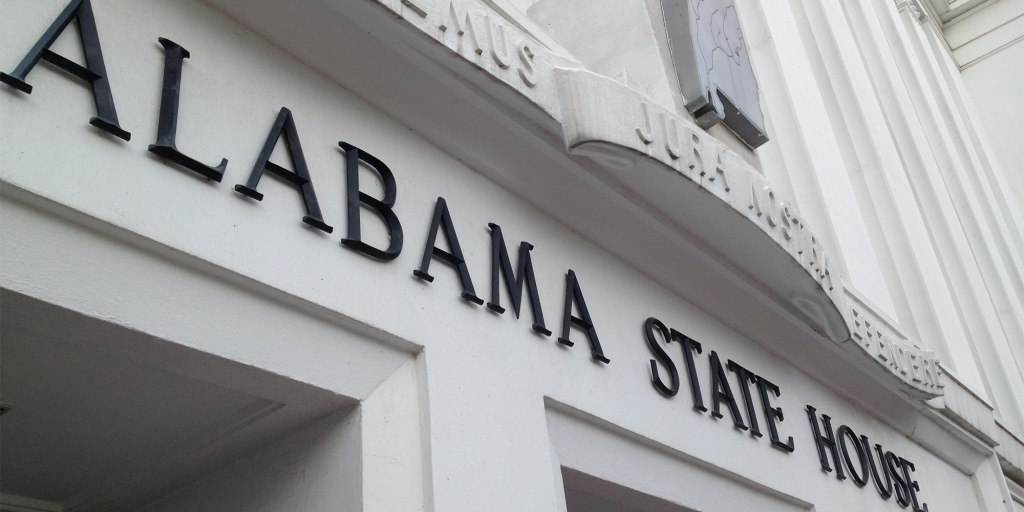
The Alabama House of Representatives will convene at 1 p.m. Tuesday, and the Senate an hour later, as state lawmakers gather for the 17th day of the regular session. This week, the Senate will take up SB89 from Sen. Arthur Orr (R-Decatur), which would require Alabama public school students to pass a civics test as a requirement for graduation. Orr’s legislation has been on the agenda for a while, but has likely been stalled due to a focus on more contentious issues. The body is also slated to take up SB148 from Sen. Jim McClendon (R-Springville), which would require all vehicle passengers to wear a safety belt, and SB114 from Sen. Paul Sanford (R-Huntsville), which would regulate fantasy contests and “exempt fantasy contests from certain criminal penalties associated with gambling activity.” The bill would increase spending by the Attorney General’s office, which would be responsible for overseeing such activities, by $1 million in the first year. Also on the Senate’s agenda this week are SB14 from Sen. Gerald Allen (R-Tuscaloosa), which would allow citizens to carry a firearm in their vehicle without a permit, and SB205 from Sanford, which would bar the Alabama Department of Human Resources from renewing health center licenses for an “abortion clinic or reproductive health center” within 2,000 feet of a school. In the House, lawmakers will take up HB46 from Rep. Alan Boothe (R-Troy), which would allow Alabama spirit makers to sell fifths for off-premise consumption. The body is also slated to debate HB13 from Rep. Alan Harper (R-Northport), which would allow citizens to vote on whether or not to allow a lottery in the state – the legislation provides no details on how proceeds from such an operation would be used, which is likely why it hasn’t been discussed thus far. HB218 from Rep. Dickie Drake (R-Leeds) is also on the agenda and would require that all elementary school students be instructed in cursive writing before the end of their third grade year. HB244 from Rep. Connie Rowe (R-Jasper) will also be taken up this week – the bill prohibits law enforcement from requiring victims of a sexual offense to take a polygraph examination. Committee hearings get underway Tuesday, though the vast majority take place on Wednesday, beginning with the Senate Judiciary Committee, which will take up SB237 from Sen. Quinton Ross (D-Montgomery). Ross’s legislation would make it unlawful for employers to request information regarding arrests and convictions on employment applications. The committee will also take up Sanford’s SB115, the Senate version of “Leni’s Law” from Rep. Mike Ball (R-Madison), which would decriminalize possession of the marijuana-based medicine cannibidiol. The Senate Committee on Constitution, Ethics and Elections will debate SB360 from Sen. Tom Whatley (R-Auburn), which would require voters to register as a Democrat or Republican before voting in a primary. Voters who do not will not be allowed to vote on party candidates, only on ballot measures and nonpartisan issues. The House Committee on Agriculture and Forestry will take up HB393 from Rep. Ken Johnson (R-Moulton), which would allow for the growing of industrial hemp in the state for use in a variety of products. The House Committee on Mobile County Legislation will mull over HB248 from Rep. Napoleon Bracy (D-Mobile), which would establish a $10.10 minimum wage in Mobile County. At the close of business this week, legislators will adjourn for spring break.
Proposal circulating in Montgomery would close state primary elections
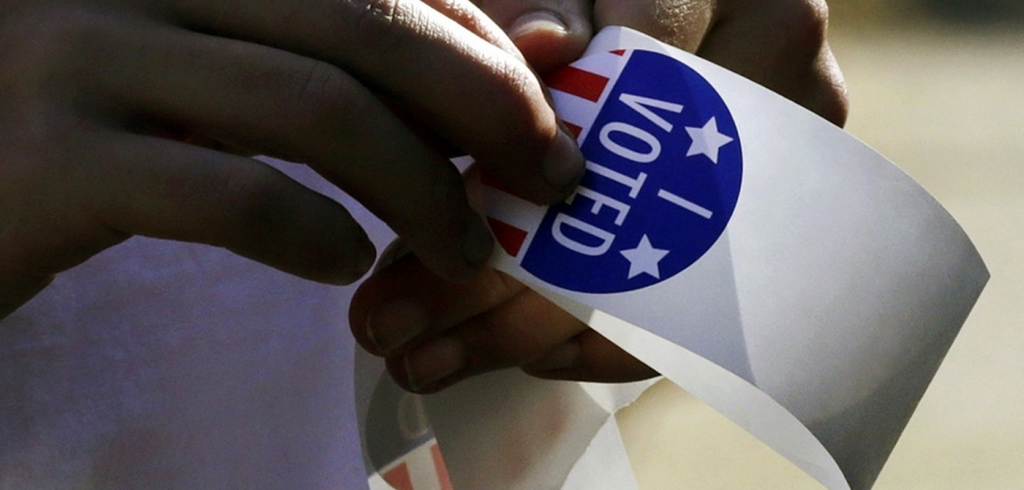
While Alabamians have already voted in the this year’s Presidential Preference Primaries, that hasn’t ended the conversation in 2016 about the state’s elections. A plan circulating in the Legislature would make Alabama one of 31 states who allow only registered Republicans and Democrats to vote in their respective primaries. SB 360 by Sen. Tom Whatley would close Alabama primaries; mandate a voter be registered with their party at least 14 days before voting in a primary; and prevent voters from switching parties in between a primary and primary run-off. Currently Alabama – like Deep South neighbors Tennessee, Georgia, and Mississippi – has open primaries. Some observers have said open primaries leading to voters casting “strategic” ballots, seeking to influence the outcome of a party they do not identify with. Alabama gave 44 of its 55 Democratic delegates to former Secretary of State Hillary Clinton while Vermont Sen. Bernie Sanders received nine during March 1 elections, as part of the newly-established “SEC Primary,” which saw Donald Trump took the lion’s share of Republican delegates, winning 36 out of 50. Texas Sen. Ted Cruz was awarded 13 delegates while Florida Sen. Marco Rubio managed to snag one. Trump and Sanders have both done better in open-primary states than those with traditional closed primaries and caucuses. SB 360 is co-sponsored by Sen. Cam Ward and Sen. Trip Pittman. Anonymous sources told Alabama Today on Thursday there is “much GOP support for this proposed legislation.”
House OKs bill to fund wireless networks in schools

The Alabama House of Representatives voted unanimously Thursday to approve a bill to provide $12 million in funding to help schools in rural parts of the state gain access to broadband Internet service. HB41, also referred to as the Wired Act, by Rep. Donnie Chesteen (R-Geneva), seeks to tackle a difficult problem that has left many schools behind in regard to technology. In the past, the federal government has assisted schools in purchasing computers through the E-rate program, funded through fees levied on telecommunications companies. To gain access to that money, schools have to match the funds through local dollars. Because of that, many of Alabama’s poorest schools have been unable to come up with the required matches. Currently, about 91 Alabama schools are set to miss out if they are unable to meet a deadline later this month. Chesteen’s bill pulls money from a state education technology fund in order to assist schools in matching E-rate funding. The legislation is built upon an earlier bill from Sen. Gerald Dial (R-Lineville), which failed to pass both houses when its effort to acquire a $100 million bond to fund “pen enabled tablets and mobile computers” was thought to become quickly obsolete. Chesteen’s bill also takes on another of the House GOP’s agenda items, which was to see better technology installed in rural parts of the state. However, the legislation is separate from the proposals from Gov. Robert Bentley and a Senate bill from Sen. Tom Whatley (R-Auburn), which would decrease regulations on telecommunication service providers to enhance access to broadband service in rural parts of the state. With its passage in the House, Chesteen’s bill is set to go before the Senate next week.
Senate passes slew of bills with nearly empty chamber
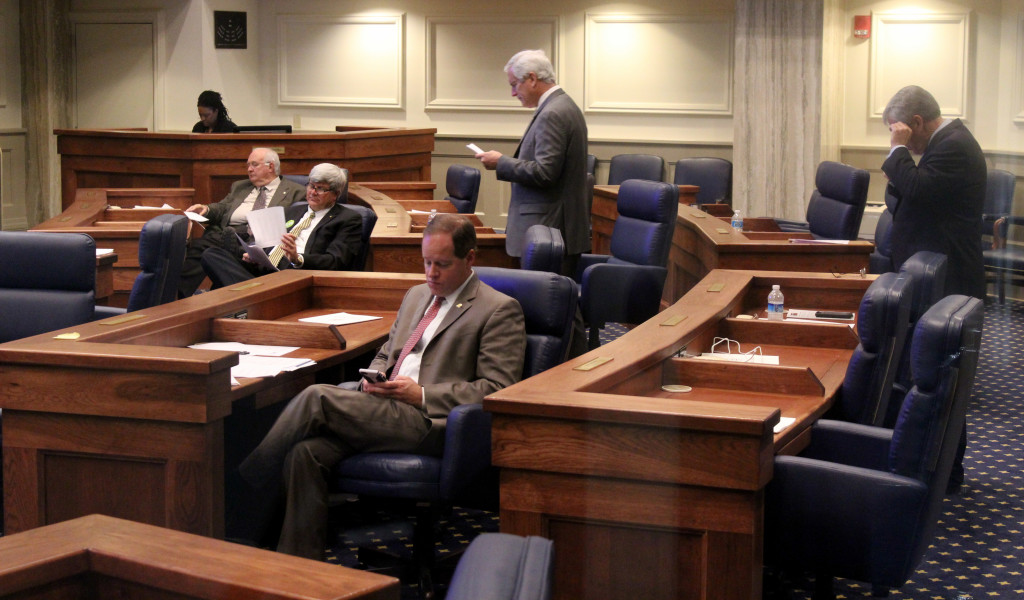
During Thursday’s legislative session, a variety of bills were passed on the Senate floor with at one point, only 13 lawmakers attending. The number of senators slowly dwindled throughout the session until a most were absent. Among the bills passed with a nearly empty chamber were SB95 from Sen. Dick Brewbaker (R-Montgomery), which allows foster children to visit friends without the permission of the foster agency; SB131 from Sen. Paul Sanford (R-Huntsville), which provides a tax break for the money people pay into their Health Savings Accounts; SB103 from Sen. Tom Whatley (R-Auburn), which would increase the cost of waterfowl stamps; and SB215 from Sen.Jimmy Holley (R-Elba), which allows for “automated civil enforcement” of school bus violations and at least five others. The only bill that faced real conversation was SB148 from Sen. Jim McClendon (R-Springville), which would require all passengers in a car to wear a seat belt. Currently, everyone under 15 years of age is required to buckle a safety belt in the back seat of a car. McClendon’s bill would require everyone to do so. Sen. Trip Pittman (R-Montrose) opposed the measure on the grounds that it is an overreach to require all car riders to fasten a safety belt, which McClendon asserts would save lives. Sen. Vivian Figures (D-Mobile), who noted her support for wearing seat belts, contested the requirement that drivers be charged with the folly of their passengers. The Senate carried McClendon’s bill over and adjourned shortly thereafter.


